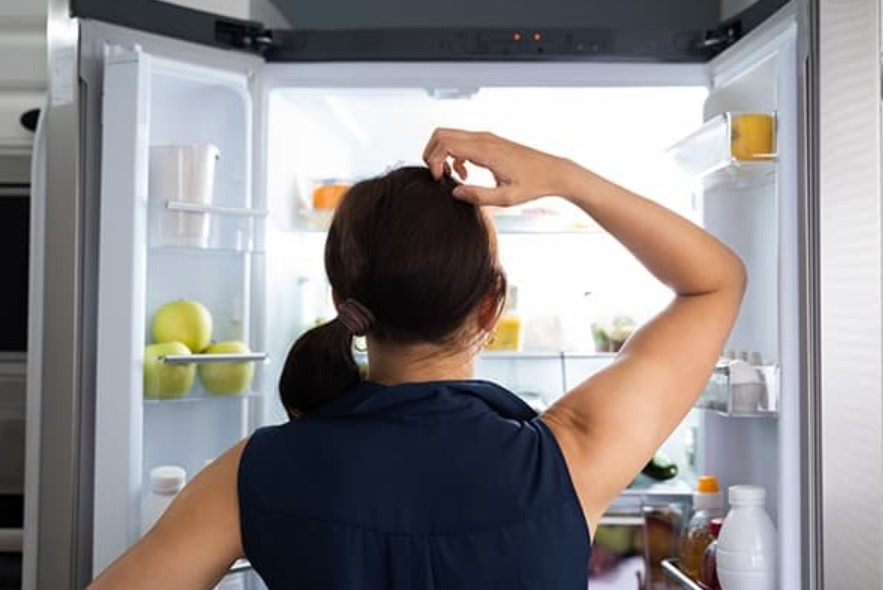Contents
It’s frustrating when your refrigerator seems to be doing its job, keeping your food cool and fresh, but your freezer just won’t freeze. You might open your freezer expecting rock-hard ice cubes or frozen veggies, only to find them soft or thawing. So, why is your refrigerator working but the freezer isn’t freezing? There are several reasons for this common problem, but the good news is, many of these issues can be addressed with the right knowledge and tools. Let’s explore the potential causes and solutions to get your freezer back to freezing!
Common Causes of Freezer Not Freezing
There are a few typical reasons why your freezer might not be getting cold, even if your refrigerator appears to be working fine. Understanding these causes can help you troubleshoot effectively and even solve the problem yourself in some cases.
1. Faulty Evaporator Fan
The evaporator fan is responsible for circulating cold air from the freezer coils to the entire freezer compartment. If this fan isn’t working properly, your freezer won’t be able to maintain the low temperatures required to freeze food. You may notice that the freezer feels warm, but the refrigerator is still cool.
Solution: Check if the evaporator fan is spinning. If it’s not, the fan might need to be replaced, which is a common repair task for technicians.
2. Defrost System Malfunction
If your freezer’s defrost system isn’t working, frost can build up on the evaporator coils, preventing proper airflow. This will lead to your freezer not freezing, even though the fridge section may still be cooling properly.
Solution: You can manually defrost the freezer by unplugging it and letting the ice melt. But for a long-term fix, you’ll need to check components like the defrost heater or defrost timer and replace them if necessary.
3. Clogged or Blocked Air Vents
Your refrigerator and freezer rely on a system of vents to maintain the proper balance of air between the compartments. If these vents are blocked by food items or frost buildup, the freezer may not get enough cold air.
Solution: Inspect the vents to ensure they are clear of any obstructions. Rearranging food or removing ice buildup could solve the problem immediately.
4. Compressor Issues
The compressor is the heart of your refrigerator and freezer’s cooling system. If the compressor is running, but your freezer isn’t freezing, it could be a sign that the compressor isn’t working efficiently or is starting to fail. However, since your refrigerator is still cooling, this might indicate a partial failure.
Solution: If you suspect the compressor is the issue, it’s best to call in a professional. Replacing or repairing a compressor can be complicated and expensive.
5. Temperature Control Thermostat
Your freezer’s temperature may not be freezing if the temperature control thermostat is malfunctioning. This component controls the cooling cycle by regulating the compressor and evaporator fan. If the thermostat is faulty, the freezer may not reach the required cold temperatures.
Solution: Test the thermostat by adjusting it. If you hear a click or the freezer starts freezing again after making adjustments, the thermostat might be at fault and may need to be replaced.

Other Potential Reasons for a Warm Freezer
While the above reasons are the most common culprits, there are other factors that could be contributing to your freezer not freezing properly.
Dirty Condenser Coils
Over time, the condenser coils located at the back or bottom of your refrigerator can accumulate dust and debris. If the coils are dirty, it reduces their ability to dissipate heat, affecting the cooling process and making it harder for the freezer to reach freezing temperatures.
Solution: Clean the condenser coils using a vacuum cleaner or coil brush. This is an easy DIY fix that can often improve your freezer’s performance.
Freezer Door Seal Problems
A damaged or worn-out freezer door seal (also known as a gasket) can prevent the freezer from closing tightly. When this happens, warm air from outside enters the freezer, making it difficult for it to maintain freezing temperatures.
Solution: Inspect the door seal for any cracks or gaps. If the seal is damaged, replacing it is usually a simple and inexpensive fix.
Overstuffed Freezer
If your freezer is packed with food, it can block air circulation. Freezers rely on consistent airflow to maintain cold temperatures. If airflow is restricted, some areas of the freezer may not freeze properly.
Solution: Reorganize your freezer to allow space between items for proper airflow. Avoid overloading it, as this can cause uneven cooling.
How to Troubleshoot Your Freezer Not Freezing
Now that we’ve covered some of the most common causes, you can try a few troubleshooting steps to pinpoint the issue. Here’s a quick guide to get started:
- Check the Temperature Settings: Make sure the freezer temperature is set correctly (usually around 0°F or -18°C).
- Inspect the Evaporator Fan: Listen for the fan when you open the freezer door. If it’s not running, this could be the source of your problem.
- Look for Frost Buildup: Check if there’s excessive frost on the coils or vents. This could indicate a defrost system failure.
- Clean the Coils: If the condenser coils are dusty, cleaning them could restore your freezer’s ability to cool efficiently.
- Examine the Door Seal: Ensure the freezer door seals tightly to keep warm air out.
Conclusion
When your refrigerator is working but your freezer isn’t freezing, it can be a frustrating situation, but fortunately, it’s often a problem that can be solved with some troubleshooting and minor repairs. From a faulty evaporator fan to blocked air vents or a defrost system failure, understanding the potential causes can help you address the issue quickly and avoid costly repairs down the line. Remember, regular maintenance, such as cleaning coils and ensuring proper airflow, can go a long way in keeping your freezer working efficiently.
Frequently Asked Questions (FAQs)
Why is my freezer not freezing, but my fridge is still cold?
This could be due to several reasons, such as a faulty evaporator fan, a malfunctioning defrost system, or blocked air vents. Each of these components affects the freezer’s ability to freeze while allowing the fridge to maintain cool temperatures.
Can a clogged air vent cause the freezer not to freeze?
Yes, if the air vent between the refrigerator and freezer is blocked, it can reduce cold air circulation, leading to a warm freezer.
Should I repair or replace my refrigerator if the freezer stops freezing?
It depends on the cause of the problem and the age of your appliance. If it’s an issue with the thermostat or door seal, a repair might be sufficient. But if the compressor is failing and the refrigerator is old, replacement might be more cost-effective.
How often should I clean my condenser coils?
To ensure your refrigerator and freezer operate efficiently, it’s recommended to clean the condenser coils every 6 to 12 months.
You May Also Read:





